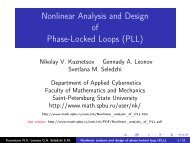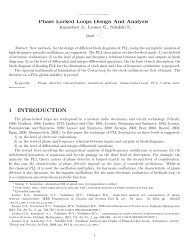Technical Sessions – Monday July 11
Technical Sessions – Monday July 11
Technical Sessions – Monday July 11
You also want an ePaper? Increase the reach of your titles
YUMPU automatically turns print PDFs into web optimized ePapers that Google loves.
TA-01 IFORS 20<strong>11</strong> - Melbourne<br />
Tuesday, 9:00-10:30<br />
� TA-01<br />
Tuesday, 9:00-10:30<br />
Plenary Hall 3<br />
IFORS Survey on OR Practice 1<br />
Stream: OR Practice<br />
Invited session<br />
Chair: John Ranyard, The Management School, Lancaster University,<br />
Department of Management Science, LA1 4YX, Lancaster,<br />
Lancashire, United Kingdom, jranyard@cix.co.uk<br />
1 - Some Overall Results from the Global OR Practice Survey<br />
John Ranyard, The Management School, Lancaster University,<br />
Department of Management Science, LA1 4YX, Lancaster,<br />
Lancashire, United Kingdom, jranyard@cix.co.uk<br />
IFORS have commissioned a survey of OR practice in member countries, so<br />
as to gain a better understanding of the usage of quantitative tools, techniques<br />
and approaches and their impact on decision-making in organisations, as well<br />
as the background of the OR analysts involved. It is expected that the results<br />
will enable IFORS to improve their support to and promotion of OR in member<br />
countries. Over 250 practitioners from 28 member countries completed a comprehensive<br />
on-line questionnaire and some overall results will be presented.<br />
2 - OR Practice in the United States<br />
Karla Hoffman, Department of Systems Engineering and<br />
Operations Research, George Mason University, Mail Stop 4A6,<br />
4400 University Drive, 22030, Fairfax, Virginia, United States,<br />
khoffman@gmu.edu<br />
We present results from a survey on OR practice that was distributed to a few<br />
of the practice subdivisions within INFORMS. We also describe the recent activities<br />
related to the new theme of "analytic" that has made the sale of OR<br />
activities much easier and understandable to a wider business community.<br />
3 - IFORS OR Practice Survey: Some Key UK Results<br />
John Ranyard, The Management School, Lancaster University,<br />
Department of Management Science, LA1 4YX, Lancaster,<br />
Lancashire, United Kingdom, jranyard@cix.co.uk<br />
Over 80 responses were received from the UK and some key results will be<br />
presented, covering the location of OR services, techniques, methodologies<br />
and software used, barriers to the use of OR and personal education and training<br />
received. Changes compared to a similar survey which was carried out 15<br />
years ago will be highlighted. Some comments on current issues facing OR<br />
practitioners in the UK will be made.<br />
� TA-02<br />
Tuesday, 9:00-10:30<br />
Meeting Room 101<br />
Game Theory Applications in Operations<br />
Management III<br />
Stream: Game Theory<br />
Invited session<br />
Chair: Vincent Knight, School of Mathematics, Cardiff University,<br />
CF24 4AG, Cardiff, United Kingdom, Knightva@cf.ac.uk<br />
1 - A Search Problem on a Finite Network with Traveling<br />
and Examination Costs<br />
Kensaku Kikuta, School of Business Administration, University<br />
of Hyogo, Gakuen-nishi 8-2-1,Nishi-ku, 651-2197, Kobe, Japan,<br />
kikuta@biz.u-hyogo.ac.jp<br />
We analyze mathematically variations of a search problem on a finite network<br />
: There is an immobile hider in a node. A seeker inspects each node until he<br />
finds the hider, traveling along edges. Associated with an inspection of a node<br />
is the inspection cost, and associated with a movement from a node to a node<br />
is a traveling cost. A strategy for the seeker is an ordering of nodes in which<br />
the seeker inspects each node in that order. The seeker wishes to minimize the<br />
sum of these costs which are required to find the hider.<br />
30<br />
2 - Sell E-Readers or E-Books? A Competitive Perspective<br />
Lijun Ma, Management School, Shenzhen University, Rm1416,<br />
Arts Building, Shenzhen, Guangdong, China,<br />
lijun.ma@gmail.com, Xiaoying Liang, Houmin Yan<br />
Motivated by observations of the e-book reader market, in this paper we consider<br />
the competition in a market composed of both integrated and unintegrated<br />
firms with vertically complementary and horizontally substitutable products.<br />
Using a stylized game-theoretical model, we find that the orders of access costs,<br />
equilibrium prices, and customer characteristics are all correlated, which is the<br />
case under both duopoly and oligopoly. This reveals strategic positions of different<br />
types of firms in the competitive market.<br />
3 - Analyses of Location-Price Game on Networks with<br />
Stochastic Customer Behavior and its Heuristic Algorithm<br />
Fengmei Yang, Dept. of Mathematics and Informatics, Beijing<br />
University of Chemical Technology, School of Science, 100029,<br />
Beijing, China, yang_fengmei@sina.com<br />
In this paper, a two-stage model is developed to investigate the location strategy<br />
and the commodity pricing strategy for a retail firm that wants to enter a<br />
spatial market with multiple competitive facilities. Expected market shares are<br />
calculated based on the stochastic customer behavior on networks. We provide<br />
a sufficient condition for the existence of equilibrium prices in the price<br />
game for the first time. The existence and uniqueness of the pure strategy Nash<br />
equilibrium price with a specified utility function is proved in the subgame. A<br />
metaheuristic based on Tabu search is proposed.<br />
4 - The Price of Anarchy of Health Care<br />
Vincent Knight, School of Mathematics, Cardiff University,<br />
CF24 4AG, Cardiff, United Kingdom, Knightva@cf.ac.uk, Paul<br />
Harper<br />
It is well observed that individual behavior can have an effect on the efficiency<br />
of queuing systems. In this paper we present a routing game model<br />
for the choices made by individuals when choosing between health care facilities.<br />
These choices take in to account travel distance, facility congestion and<br />
reputation. Results concerning the price of anarchy, an analytical measure of<br />
the inefficiency of choice, are obtained. The theoretical ideas presented are<br />
demonstrated by calculating the price of anarchy for a large case study.<br />
� TA-03<br />
Tuesday, 9:00-10:30<br />
Meeting Room 102<br />
Simulation at Container Terminals<br />
Stream: Meta-heuristics<br />
Invited session<br />
Chair: Carsten Boll, Fachbereich 2, Hochschule Bremerhaven, An<br />
der Karlstadt 8, 27568, Bremerhaven, Bremen, Germany,<br />
cboll@hs-bremerhaven.de<br />
1 - Evaluation of AGV Dispatching Plans in Seaport Container<br />
Terminals using Simulation<br />
Evelina Klerides, Business School, Imperial College London,<br />
Flat 43 Apsley House, 23-29 Finchley Road, NW8 0NY, London,<br />
United Kingdom, e.klerides@hotmail.com, Panagiotis<br />
Angeloudis, Eleni Hadjiconstantinou, Michael Bell<br />
We consider the Automated Guided Vehicle (AGV) dispatching problem in<br />
container terminals where vehicles are allowed to carry more than one container<br />
at a time. This paper presents a micro-simulation framework that seeks<br />
to a real-life automated port. The framework validates/evaluates the operational<br />
results obtained from an optimization model designed specifically to find the<br />
optimal solution to the dual-load AGV dispatching problem. We report on various<br />
performance measures associated to container terminals and compare the<br />
results to those obtained using heuristic rules.




